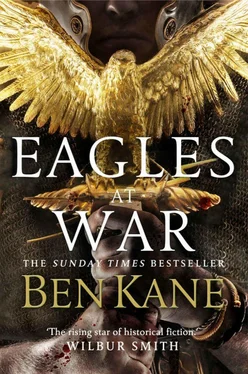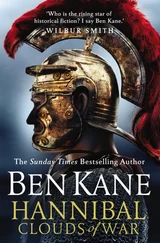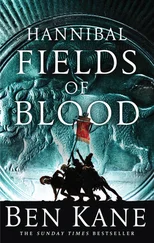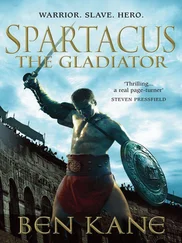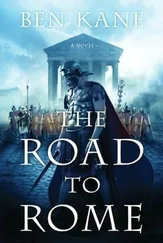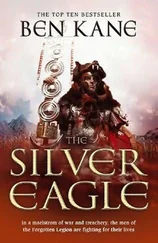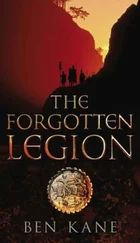Ben Kane - Eagles at War
Здесь есть возможность читать онлайн «Ben Kane - Eagles at War» весь текст электронной книги совершенно бесплатно (целиком полную версию без сокращений). В некоторых случаях можно слушать аудио, скачать через торрент в формате fb2 и присутствует краткое содержание. Год выпуска: 2015, ISBN: 2015, Издательство: Random House, Жанр: Исторические приключения, на английском языке. Описание произведения, (предисловие) а так же отзывы посетителей доступны на портале библиотеки ЛибКат.
- Название:Eagles at War
- Автор:
- Издательство:Random House
- Жанр:
- Год:2015
- ISBN:9781409052210
- Рейтинг книги:3 / 5. Голосов: 1
-
Избранное:Добавить в избранное
- Отзывы:
-
Ваша оценка:
- 60
- 1
- 2
- 3
- 4
- 5
Eagles at War: краткое содержание, описание и аннотация
Предлагаем к чтению аннотацию, описание, краткое содержание или предисловие (зависит от того, что написал сам автор книги «Eagles at War»). Если вы не нашли необходимую информацию о книге — напишите в комментариях, мы постараемся отыскать её.
Eagles at War — читать онлайн бесплатно полную книгу (весь текст) целиком
Ниже представлен текст книги, разбитый по страницам. Система сохранения места последней прочитанной страницы, позволяет с удобством читать онлайн бесплатно книгу «Eagles at War», без необходимости каждый раз заново искать на чём Вы остановились. Поставьте закладку, и сможете в любой момент перейти на страницу, на которой закончили чтение.
Интервал:
Закладка:
‘That is why they will die like beasts.’
They deserve nothing better, thought the boy.
The Roman’s shouting came to an abrupt halt as he was beaten to the ground by several acolytes. A gag was tied around his mouth. When that had been done, the priest stooped over the man on the table. A hideous shriek shredded the air. It rose higher than the boy would have thought possible. The priest placed something small, red and wet by the man’s side, and his screaming eased a little. A heartbeat later, it returned to its previous level, as the priest used his probe to delve into the man’s second eye socket.
Holding two small globes high with a scarlet-coated hand, the priest faced the warriors. ‘Blinded, the Roman cannot see us! Accept this offering, Great Donar!’
‘DO-NAR! DO-NAR! DO-NAR!’ the boy yelled until he felt his voice crack.
Sparks flared as the priest tossed the eyeballs into the fire.
‘DO-NAR!’ roared the warriors.
Replacing the probe, the priest selected a long-bladed knife. Dark blood gushed over his hands as he poked around in his victim’s mouth. A burbling scream rose, and the man thrashed about on the table.
‘Without a tongue, the Roman cannot speak his lies!’ A piece of flesh flew from the priest’s hand into the flames.
The boy closed his eyes. The prisoner has to die, he thought. He could have been the one who slew my cousins. A sharp jab from his father’s elbow forced him to observe once more.
‘DO-NAR!’
The priest plunged his blade into the Roman’s chest. With business-like intensity, he twisted it to and fro. The staccato rhythm of the man’s heels on the table went faster and faster, but then slowed right down. By the time the priest had discarded his knife in favour of a saw, they had stopped moving altogether. Before long, he had cracked open the man’s ribcage and freed his victim’s heart from the network of vessels that surrounded it. He brandished the small, bloody globe at the warriors like a battle trophy. ‘Without a heart, the Roman has no courage! No strength!’
‘DO-NAR! DO-NAR! DO-NAR!’
The boy was grateful for the shouting. Despite his hatred of the Romans, the spectacle was turning his stomach. He watched through half-closed eyes as the victim’s body was heaved on to the pyre and set alight, and as the second, third and fourth Romans were dispatched in similar manner to the first.
At length, Segimer noticed. ‘Observe everything!’ he snapped.
He obeyed with reluctance.
Segimer’s breath was hot in his ear. ‘Do you know how one of your cousins died?’
The boy wanted to answer, but his tongue felt like a plank in his mouth. He shook his head.
‘He had been trying to defend his mother, your aunt, from harm. He was only a boy, of course, so the Romans disarmed him with ease. They held him down, and one of them ran a spear up his arse. Right up, inside him. The whoreson didn’t shove it in far enough to kill him straightaway, though. He lingered on while they murdered his brother and violated his mother in front of him.’
Hot tears – of rage, of fear – ran down the boy’s cheeks, but his father wasn’t done.
‘Your poor bastard of a cousin was still alive when we reached the village that evening. It was left to his father, your uncle, to end his life.’ Segimer pulled the boy’s chin up, forcing him to meet his gaze. ‘These are the kind of creatures that the Romans are. D’you see?’
‘Yes, Father.’
‘Would you want something like that to happen to your mother, or your younger brother? To your grandmother?’
‘No!’
‘Accept then that giving the Romans to Donar in this way is a good thing. A necessary thing. With the thunder god’s approval, we cannot fail to defeat them.’
‘I understand, Father.’
Segimer’s eyes searched his, but the boy did not look away. At last his father nodded.
He watched every moment of the rest of the gory ceremony. Runnels of clotted blood coated the sacrificial table, and the air filled with a cacophony of screams and the cloying smell of burning flesh. Whenever the boy’s stomach protested, he made himself think of his cousin, impaled on a spear, watching his mother and brother being abused and tortured. Those images drove all else before them. They made him thrum with rage, made him want to grab the priest’s knife and stick it in Roman flesh.
I will remember this night forever, he pledged to himself. One day, as Donar is my witness, I will teach the Romans a lesson that they will never forget.
I, Ermin of the Cherusci, swear this.
PART ONE
Spring, AD 9
The German frontier
I
Arminius sat astride a fine chestnut horse, watching eight turmae of his cavalry canter to and fro across the vast parade ground outside the fortified camp of Ara Ubiorum. It was a fine morning, cool and crisp. The last signs of winter had vanished, and the fertile landscape around the camp was a bright shade of green. Skylarks swooped and darted overhead, but their delicate cries were drowned out by the pounding of horses’ hooves on the packed earth, and the shouted commands of Arminius’ junior officers.
Like his troops, his dress was a mixture of Roman and German: a mail shirt and silvered cavalry helmet contrasted with a tribesman’s wool cloak, tunic, patterned trousers and ankle boots. A fine spatha , or long cavalry sword, hung from a gilt-decorated baldric over his shoulder. He was in the prime of life, large-framed and striking-looking, with intense grey eyes, black hair and a bushy beard of the same colour.
His five hundred Cheruscan warriors formed the ala , or cavalry unit, attached to the Seventeenth Legion. They served as scouts, and provided flanking cover to marching legionaries, but they could also be used in battle. This necessitated training on a regular basis, and Arminius was here to supervise his men to do just that. He had watched these exercises countless times, and knew every move inside out. His well-trained riders made few mistakes, so it wasn’t long before his mind began to wander. The previous day, he’d had his ear bent by a chieftain in a village on the far bank of the River Rhenus. The man had made vociferous complaints about the new imperial tax. It wasn’t the first time Arminius had encountered such resentment. Here in Gaul, the only Germans were auxiliaries in the legions, well-paid men who were content with their lot. On the other side of the river, among the tribes, it was a different story.
Governor Varus and his contemporaries were oblivious to the discontent, Arminius thought. In their minds, the Romanisation of Germania was proceeding just as it should. There were numerous permanent and temporary military camps scattered throughout a vast area more than three hundred miles deep and half that across. At least half the region’s tribes were allied to the empire, or had made treaties with it. A few skirmishes aside, peace had reigned for several years. The legions’ engineering works each summer meant that an increasing number of roads were being paved. One settlement – Pons Laugona – was well on the way to becoming the first Roman town east of the Rhenus, with its forum, municipal buildings and sewerage system. There were other communities eager to follow this example. Even in the villages, it was becoming common to hold a regular market. Imperial law was permeating into tribal society; magistrates from Ara Ubiorum and other camps west of the Rhenus now made regular journeys over the river to adjudicate in land disputes and other legal matters.
These social changes had angered some tribesmen, thought Arminius, but a good number had been happy enough, in the main because living standards had risen. Legionaries required vast quantities of food, drink and clothing. Farmers who lived near the camps could sell livestock, grain and vegetables, wool and leather. Their women were able to peddle clothing, and if they desired, their hair. Prisoners taken in clashes with other tribes could be sold as slaves, and trapped wild animals – for use in the military camps’ amphitheatres – fetched considerable sums. Young men could join the Roman army, escaping their mundane lives on farms. Enterprising individuals opened taverns and restaurants beside the military bases, or found employment inside them.
Читать дальшеИнтервал:
Закладка:
Похожие книги на «Eagles at War»
Представляем Вашему вниманию похожие книги на «Eagles at War» списком для выбора. Мы отобрали схожую по названию и смыслу литературу в надежде предоставить читателям больше вариантов отыскать новые, интересные, ещё непрочитанные произведения.
Обсуждение, отзывы о книге «Eagles at War» и просто собственные мнения читателей. Оставьте ваши комментарии, напишите, что Вы думаете о произведении, его смысле или главных героях. Укажите что конкретно понравилось, а что нет, и почему Вы так считаете.
